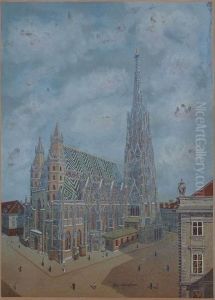Christian Aug. Gunther Paintings
Christian August Günther was a German artist known primarily for his work in porcelain. Born in 1771, Günther's artistic journey is closely linked to the growth and prestige of the European porcelain industry during the late 18th and early 19th centuries. Although not as widely recognized as some of his contemporaries, his contributions were significant in the context of decorative arts during this period.
Günther's career is often associated with the famous Meissen porcelain factory, which was the first European hard-paste porcelain manufacturer established in 1710 near Dresden in Saxony. His work at Meissen contributed to the factory's reputation for high-quality porcelain and innovative designs. Günther's skill set would have included not only the sculpting and modeling of porcelain figures but also possibly the intricate painting and glazing techniques that were characteristic of Meissen's finest creations.
The historical records detailing Günther's life and career are sparse, and much of what is known about him comes from his association with the porcelain he helped create. The period in which he lived was one of considerable political and social change in Europe, with the Napoleonic Wars and the subsequent reshaping of the continent influencing economics and culture. The demand for luxury items such as porcelain often reflected the stability and wealth of the region, and artisans like Günther were part of a complex network of craftspeople, merchants, and patrons.
Christian August Günther passed away in 1837. By this time, the European porcelain industry was facing new challenges and changes, including increased competition and the evolution of styles. Günther's legacy, while perhaps not as individually prominent as some artists, is preserved through the pieces of Meissen porcelain that continue to be appreciated by collectors and art historians for their beauty and craftsmanship. His life's work remains a testament to the skilled artisans who contributed to the rich tradition of European decorative arts.

